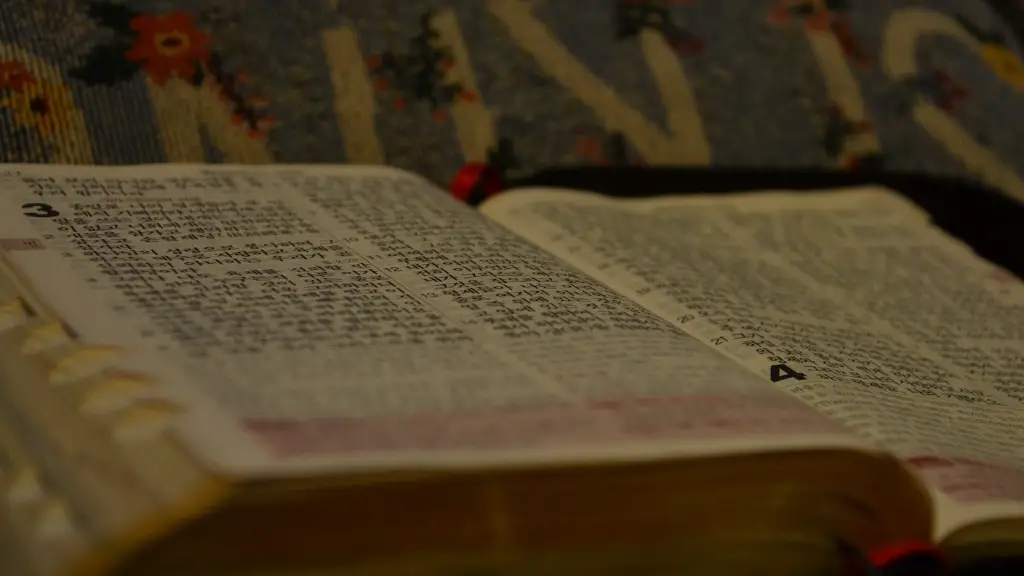The Bible speaks of the rapture many times, though it doesn’t use the word itself. The concept of the rapture is derived from 1 Thessalonians 4:13-18, which talks about Jesus coming in the clouds to gather the Church. The general interpretation of this passage speaks of a pre-tribulation rapture, which is when believers are taken out of the world before the tribulation period. The idea of the rapture is most likely derived from the Book of Daniel, where it talks of the elect or chosen being taken away. This concept of God’s chosen being taken away by Him before the end times is echoed throughout the Bible.
When it comes to the timing of the rapture, the Bible is less specific. 1 Thessalonians 4:13-18 clearly states that Jesus will come to gather us “in the clouds”, and that it will happen “in a moment, in the twinkling of an eye”. This is how rapture is often interpreted: a sudden, unexpected event that happens “in the twinkling of an eye”. The Bible is also clear about one point: that the rapture will happen before the tribulation and the great torment ( Matt 24:21).
The Bible also mentions the rapture in 1 Corinthians 15:51-52, which states that “we shall all be changed” and “in a moment, in the twinkling of an eye,” which is yet another reference to the pre-tribulation rapture. This passage speaks of the saints being “caught up” in the clouds to meet the Lord in the air. This is another reference to the rapture.
The Book of Revelation also speaks of the rapture. Revelation 4:1 speaks of a “door in the Heaven” that is opened, which is interpreted as a reference to the rapture since this is when the Church is gathered. The seals of Revelation 6:9-11 and 14:14-20 also speak of a group of people being taken away, which is yet another reference to the rapture.
In summation, the rapture is a concept that is clearly mentioned throughout the Bible. It is mentioned in 1 Thessalonians 4:13-18, 1 Corinthians 15:51-52, the Book of Daniel, and Revelation 4:1 and 6:9-11 and 14:14-20. It is always referred to as a pre-tribulation event, where Jesus comes in the clouds to take away His chosen people “in a moment, in the twinkling of an eye”.
1. What is the Rapture?
The rapture is a Christian doctrine which teaches that believers will be taken from the world prior to the tribulation. This teaching is based on passages from the New Testament, most notably in the letters to the church in Thessalonika. It is the belief that where believers will be removed in a single “Twinkling of an Eye” event, and taken to Heaven where they will be with Jesus.
The rapture is a source of comfort and hope for Christians, who are promised that they will not endure either the Great Tribulation or the Devil’s wrath which they believe will be unleashed during the end of days. In the rapture, they believe they will join Jesus in Heaven, where they will live with Him in eternal bliss.
However, some theologians and Bible commentators have said that the rapture is not a biblical concept but is actually a misunderstanding of certain New Testament passages. Typically, these passages are taken out of their original context, which can lead to misinterpretations. Other theologians and commentators believe that the idea of the rapture pre-dates and even contradicts what is explicitly taught in the Bible.
2. What is the Origin of the Rapture?
The concept of the rapture appears to have originated in the teachings of Jesuit priest Manuel de Lacunza in the late 18th century. In his book, “The Coming of the Messiah in Glory and Majesty,” Lacunza developed a theology of “any moment” expectations. According to his teachings, Jesus will come at any moment and take His church away before the Great Tribulation.
Although Lacunza’s teachings weren’t widely accepted by other Catholic theologians at the time, they heavily influenced Protestant theologians in the 19th century, including John Nelson Darby, who developed the popular “pretribulationist” view of the rapture. Darby’s teachings spread throughout the Protestant world, becoming popular mainly in evangelical Christianity. It has come to be the dominant view among evangelical Protestants, who believe in the literal interpretation of the Bible.
3. What does the Bible say about the Rapture?
The Bible does not use the term “rapture” anywhere, but it does speak of a gathering of believers in the clouds that will take place at the coming of Jesus. The most popular passages that address this gathering of believers are 1 Thessalonians 4:13-18, which speaks of believers being “caught up in the clouds to meet the Lord in the air”, 1 Corinthians 15:51-52, which speaks of believers being changed in “the twinkling of an eye”, and the Book of Revelation 4:1 and 6:9-11 and 14:14-20, where it is mentioned that a group of people will be taken away. These passages are commonly interpreted as being related to the rapture.
The Bible does not give a specific time for when the rapture will take place, but it makes it clear that it will happen before the great tribulation. One interpretation of 1 Thessalonians 4:13-18 is that the rapture will be a sudden event that happens before the tribulation begins, when Jesus comes in the clouds to take His people away “in a moment, in the twinkling of an eye”.
4. What are the Views on the Rapture?
There are a variety of views within Christianity as to when the rapture will take place. These views can generally be divided into two camps: pre-tribulation and post-tribulation. The pre-tribulation view holds that the rapture will happen before the tribulation period. This is the most popular view among evangelical Protestants, who believe in the literal interpretation of the Bible. The post-tribulation view holds that the rapture will take place after the tribulation period. This view is less popular, but is still held by a number of denominations within Christianity.
The exact timing of the rapture is still disputed, as it is not explicitly stated in the Bible. It is safe to say that believers will be taken out of the world before the Great Tribulation and the day of judgement. Fortunately, there is nothing to fear, as it is clear from the Bible that God will never abandon his people and that he will always be with us, even in the darkest of times.
5. What are the Consequences of Believing in the Rapture?
Believing in the rapture can bring about a variety of consequences. For some, it can lead to a false sense of security, as they are assured that they will be taken away prior to the tribulation period. This can lead to complacency and a lack of action when it comes to addressing issues in the present. Other consequences can include an apathy towards the plight of people living in the present, as their ultimate hope is in the rapture and not the changes that would need to be made in the here and now.
On the other hand, believing in the rapture can be a source of comfort and hope. It can give believers a sense of peace, knowing that God is in control of the future and that He will take care of them no matter what happens. It can also give them hope and motivation, as they look to the future and strive to live in a way that is pleasing to God.
6. What are the Problems with Believing in the Rapture?
One of the main problems with believing in the rapture is that it is often taken out of its biblical context. As previously noted, 1 Thessalonians 4:13-18 makes it clear that the rapture will happen before the tribulation. However, some people misinterpret this to mean that they are “safe” from all forms of suffering, when in fact the passage is specifically talking about the suffering of the Great Tribulation period. This misunderstanding can lead to a false sense of security and even complacency, as believers fail to take action and address the issues of the present due to their reliance on the rapture for the future.
Another problem with believing in the rapture is that it can be used to justify a lack of action in the face of suffering. Believers can become apathetic towards the plight of people in the present, as they are assured that they will be taken out of the world before the tribulation period. This can lead to a inaction in the face of suffering and a lack of compassion for those who are suffering in the present.
7. What is the Significance of the Rapture?
The significance of the rapture lies in its dual nature as both a source of comfort and hope and a potential source of confusion and misunderstanding. From a Christian perspective, the rapture can be a source of comfort and hope, as it is a reminder that God is in control of the future and that He will never abandon His people. It can also be a source of motivation, as believers strive to live in a way that is pleasing to God and look forward to His coming again.
However, from a theological perspective, it is important to remember that the rapture is not explicitly taught in the Bible and that the passages that are often used to support its existence can be misinterpreted and taken out of their original context. It is therefore important to be mindful of how we interpret these passages and to be careful not to put too much emphasis on the rapture itself, as it can be taken out of its original context and used to justify a lack of action in the present.





